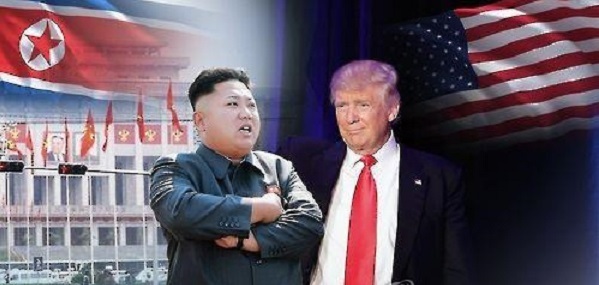WASHINGTON -- US President Donald Trump's expression of his "honored" willingness to meet with North Korean leader Kim Jong-un could be a way, albeit clumsy, of laying the groundwork for eventual resumption of negotiations, US experts said Tuesday.
Trump said in an interview with Bloomberg News Monday that he would "absolutely" be willing and "honored" to meet with Kim if such a meeting takes place "under the right circumstances." The use of the word "honored" toward the autocratic leader raised eyebrows.
 |
(Yonhap) |
Many, including senators from Trump's own Republican Party, voiced concern such a meeting could bolster Kim.
"That caught a lot of people's attention. I think it is Trump's rather inept way of trying to pave the way for diplomacy possibly, though not very likely, leading to an eventual meeting if Kim Jong-un were to 'do the right things,'" Alan Romberg, a distinguished fellow at the Stimson Center, said.
"I think Trump was trying to appeal to Kim's desire for respect from the rest of the world," he said.
It was the first time that Trump has expressed his willingness to meet with the North's leader, though he said during last year's campaigning that he would "accept" Kim to the White House and hold nuclear negotiations with him while eating a "hamburger."
Trump's remark suggests that the US and the North could ultimately be headed toward negotiations, even though the sides have rattled sabers, flexed muscles against each other and traded belligerent rhetoric warning of war over the past weeks and months.
Last week, the Trump administration also hinted it's considering dialogue. While unveiling its North Korea policy, the administration said it would ramp up pressure on Pyongyang "through economic sanctions and diplomatic measures" while remaining open to negotiations.
Secretary of State Rex Tillerson said in an interview with NPR the following day that the US is willing to hold "direct talks" with the North if the communist regime is ready to hold negotiations about the "right agenda" of ending its nuclear program.
Robert Manning, a senior fellow at the Atlantic Council, said that Trump went "way over the top" with the use of the word "honored," which was seen as one more example of Trump's fond affinity with dictators, but Trump's "unpredictability can be a useful policy tool."
"I doubt Kim and his inner circle in Pyongyang have any idea what to make of that comment," Manning said.
He pointed out a series of recent conciliatory remarks by US officials toward the North, including Tillerson's assurance what the US is looking for is not regime change, but denuclearization only, and US Pacific Commander Adm. Harry Harris' remark that the US is trying to "bring Kim to his senses, not his knees."
"Taken together I think that is a very solid public message to send to Pyongyang, and a good prelude to the implementation of financial and other sanctions that are starting to be implemented," Manning said.
Bruce Klingner, a Korea expert at the Heritage Foundation, strongly criticized Trump for using the word "honored" about a meeting with the North's dictator, stressing that the regime has "committed such egregious human rights violations against its citizens."
"The Trump administration should emphasize sanctions, pressure, and enforcing US law in its policy toward North Korea. Washington should remain open to working-level diplomatic meetings but neither senior-level meetings nor return to formal negotiations until Pyongyang indicates it is willing to abide by the basic objective of such talks, which is the denuclearization of North Korea," Klingner said. (Yonhap)





![[Exclusive] Hyundai Mobis eyes closer ties with BYD](http://res.heraldm.com/phpwas/restmb_idxmake.php?idx=644&simg=/content/image/2024/11/25/20241125050044_0.jpg)
![[Herald Review] 'Gangnam B-Side' combines social realism with masterful suspense, performance](http://res.heraldm.com/phpwas/restmb_idxmake.php?idx=644&simg=/content/image/2024/11/25/20241125050072_0.jpg)

